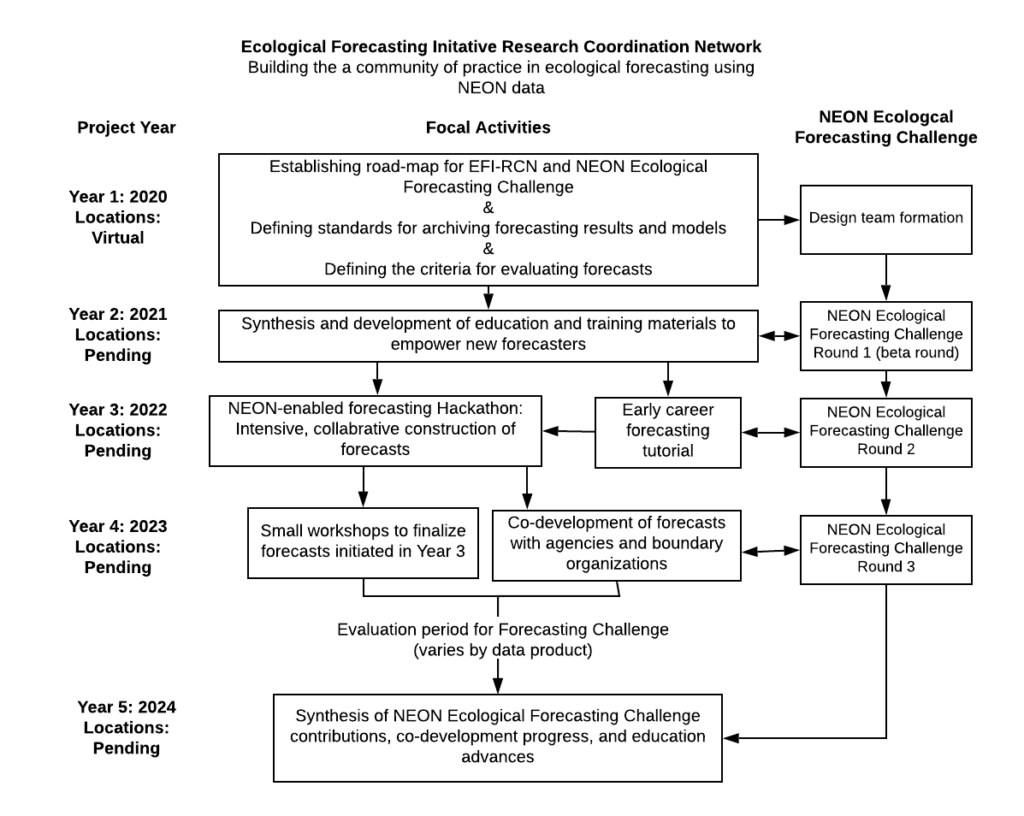The Ecological Forecasting Initiative RCN:
Using NEON-enabled near-term forecasting to synthesize our understanding of predictability across ecological systems and scales (EFI-RCN)
EFI-RCN Overview
Vision: Solve the challenge of predicting nature and, ultimately, forecast the effects of alternative environmental policies and actions.
Goal: Create a community of practice that builds capacity for ecological forecasting by leveraging NEON data products.
Objectives:
- Define community standards and best practices for developing, sharing, and archiving forecasts and models
- Increase the number and diversity of NEON-enabled forecasts by developing and hosting the NEON Ecological Forecasting Challenge
- Create educational materials to empower scientists at all career stages to forecast using NEON data products
- Support the creation of software to produce NEON-enabled forecasts at intensive and collaborative coding-focused workshops
- Align forecast outputs and decision support with the needs of forecast users at mission-driven agencies to guide decision making, and
- Synthesize forecasts to examine how limits to forecastability vary across ecological systems and scales.
Workshops and Meetings:
The RCN hosted the EFI 2023 Unconference held June 21-23, 2023 at NEON’s Headquarters in Boulder, Colorado.
The goal of the Unconference was for participants to work together on products such as developing forecasts, automating forecasts, developing teaching materials/tutorials, refining or creating software tools, analyzing forecasts for a manuscript, developing visualizations, or working on other activities proposed by the participants. Details on the Unconference webpage.
The following are blog posts sharing details about the activities from the Unconference.
- This blog post provides an overview of the Unconference and the 10 projects that were developed during the Unconference: https://bit.ly/efi-unconference-project-updates
- This post explores the challenges of transporting ecological models across multiple systems and the ability to train a model with one set of data and apply it to a new set of data.
The project group used a case study with NEON forest data and similar datasets generated under the Forest Inventory Analysis (FIA) program to applying ecological models developed for one dataset to another. - This blog post follows up on a project from the EFI 2023 Unconference which describes the work in progress to update the dashboard for the EFI NEON Ecological Forecasting Challenge. The post describes a prototype for the updates dashboard that will include the ability to synthesize forecasts submitted to the Challenge, provide summary metrics, and a self diagnostic platform for individuals and teams that submit to the Challenge.
Details and resources from previous meetings can be found HERE.
Reports:
January 2025 Report. A condensed report from the December 2024 annual report to the National Science Foundation
January 2024 Report. A condensed report from the December 2023 annual report to the National Science Foundation
January 2023 Report. A condensed and updated report from our December 2022 annual report to the National Science Foundation.
February 2021 Report. A condensed and updated report from our December 2020 annual report to the National Science Foundation.
Actual and Proposed Network Activities:

Leadership:
Project PI: R. Quinn Thomas (Virginia Tech, rqthomas@vt.edu)
Steering Committee: Michael Dietze (Boston University), Melissa Kenney (University of Minnesota), Christine Laney (NEON), Jason McLachlan (University of Notre Dame), Carl Boettiger (University of California, Berkeley), Cayelan Carey (Virginia Tech), Andy Fox (UCAR), Leah Johnson (Virginia Tech), and Jake Weltzin (USGS)
Interested in being involved? Join the Ecological Forecasting Initiative and sign-up for the EFI newletter to learn about EFI-RCN activities.
